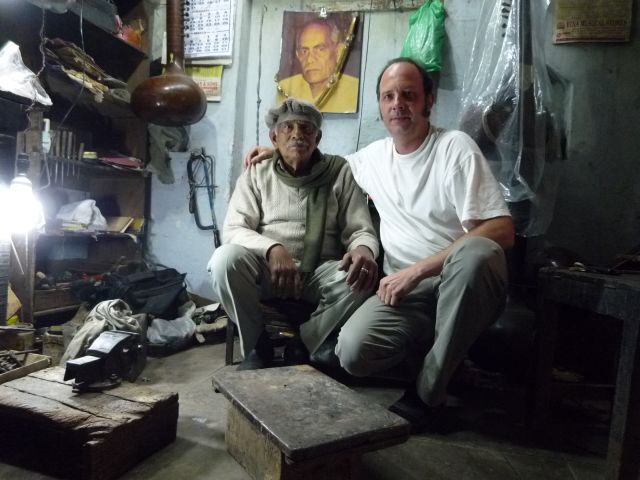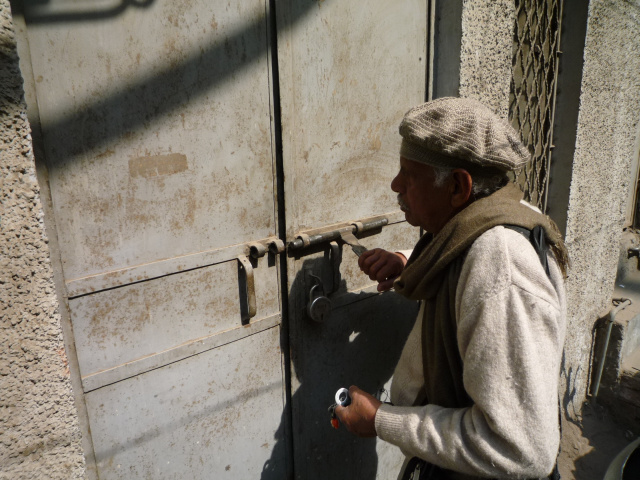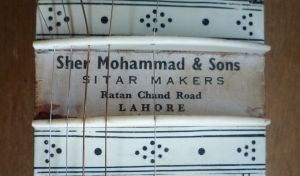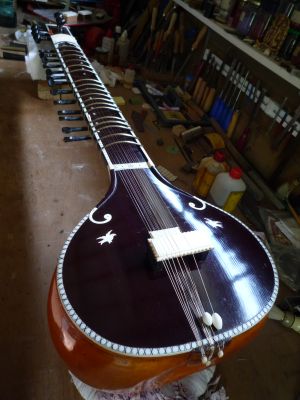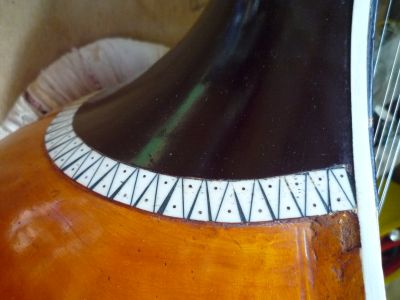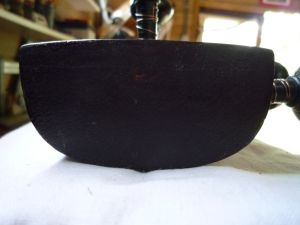In 1940, young Rikhi Ram Sharma was making harmoniums in Kartar Music House in Lahore.
One day a casual customer gets Rikhi Ram Sharma interested in a sitar. He finds and opens a simple 7 string sitar to find out how it is made and starts learning making sitars from Sher Mohammad & his son Mohammed Maksud Ali (Usef Mohammed Ali) who are running another music shop “Sher Mohammad Sitar Makers” in Bansanwala Bazaar, Lahore. They make and play sitars since many years.
There he also meets Mohan Singh (31 years old).
![]() In 1943 two young boys from Himachal Pradesh, Kartar Chand Sharma (18 years) & Hansraj Sharma (14 years), both clever and handy carpenters, join their uncle Rikhi Ram Sharma and Mohan Singh at Sher Mohammad’s shop in Lahore. They also learn how to make sitars and together they form a kind of basic sitar production line until 1947.
In 1943 two young boys from Himachal Pradesh, Kartar Chand Sharma (18 years) & Hansraj Sharma (14 years), both clever and handy carpenters, join their uncle Rikhi Ram Sharma and Mohan Singh at Sher Mohammad’s shop in Lahore. They also learn how to make sitars and together they form a kind of basic sitar production line until 1947.
In 1947, partition split the country.
Mohan Singh initially went to Amritsar and then moved to Jalandhar (Punjab) where he started the Mohan Singh Shop. In 1959 his son (nephew ??) Gurdial Singh takes over the shop and later changes the name into Gurdial Singh & Sons.
 Rikhi Ram Sharma, Kartar Chand Sharma & Hansraj Sharma moved to Delhi and started the Rikhi Ram Musical Instrument Mfg.Co. Their first workshop was initially planted in Paharganj but this is now completely demolished. The showroom of their music shop was build in Connought Place, where at present, the original shop is still there, now run by grandson Ajay Sharma.
Rikhi Ram Sharma, Kartar Chand Sharma & Hansraj Sharma moved to Delhi and started the Rikhi Ram Musical Instrument Mfg.Co. Their first workshop was initially planted in Paharganj but this is now completely demolished. The showroom of their music shop was build in Connought Place, where at present, the original shop is still there, now run by grandson Ajay Sharma.
They keep on working together until 1959.
In 1959 they get separated. Kartarchand starts his own workshop in Paharganj while in 1962 Hansraj founded Raj Musicals and got settled in a new location near Patel Nagar. The original Rikhi Ram workshop in Paharganj closes down and Rikhi Ram Sharma, together with his son Bishan Das Sharma, start a new workshop at another spot. They also attract new labour men.
Meanwhile, Kartar Chands brother Hari Chand arrives in Delhi in 1954. He gets married one year later and starts working as a mecanic craftsman at TW Carriage & Wagons workshop from the Northern Railway in Delhi. In 1962 he quits this job to join his brother in Paharganj, Together they start making sitars in the Kartar Chand Hari Chand shop at 9050/1 Multani Dhanda, Paharganj, New Delhi 110055.
 In 1974 they adopt young (14 years) and tiny Kartar (Kaku) Chand Dhiman as a fixed helper. Kaku’s uncle was at that time working in the Rikhi Ram Sharma’s sitarshop and had asked to Kartar Chand Sharma to teach his nephew how to make sitars. They continuesly built highest quality professional sitars, surbahars & tanpuras. Occasionally also sarods and dilrubas. They also specialise in repair and maintenance and do frequently repair work for Rikhi Ram Musical Instrument Mfg.Co.
In 1974 they adopt young (14 years) and tiny Kartar (Kaku) Chand Dhiman as a fixed helper. Kaku’s uncle was at that time working in the Rikhi Ram Sharma’s sitarshop and had asked to Kartar Chand Sharma to teach his nephew how to make sitars. They continuesly built highest quality professional sitars, surbahars & tanpuras. Occasionally also sarods and dilrubas. They also specialise in repair and maintenance and do frequently repair work for Rikhi Ram Musical Instrument Mfg.Co.
In januari 1993, Kartar Chand Sharma (69 years old) unfortunately passes away and Hari Chand Sharma continues the Paharganj Shop alone, regulary assisted by Kartar Chand Dhiman who himself worked out a “mobile” sitar maintenance and repair service in New Delhi for himself.
Today, Hari Chand Sharma aged 77, is getting retired. The Paharganj sitarshop will cease to exist soon. Kartar Chand Dhiman continues his flourishing mobile sitarwork in and around Delhi. He’s now busy constructing a new house in Dashrathpuri. It ‘ll have an extra room so that he’ll be able to do more sitarwork at home.
At the time of writing of this article, Hansraj Sharma is old (82 years) and sick and struggles for his life at home. His 2 sons Suman & Sanju keep on running the shop. They are specialised in Sikh musical instruments like saranda, sikh rabab, dilruba, taus, and sikh pakhawaj which were almost lost in history.
Some interesting economical info:
In 1960, the price of a 100% handmade Kartar Chand Sharma sitar was starting from Rs85 for a simple “student model” up to Rs150 for a professional and fully decorated version. Every now and then the price was raised per Rs5 only….
(Nowadays on e-bay seen $2500)
Kartar Chand Sharma, at their top, produced up to 10 sitars a month (non-decorated types = “student model” or VK model). According to the degree of decoration, the production time of a sitar easily doubles. The trio used to be assisted by a “polish” man and worked 7 days a week, from 7:00 hrs up to 19:00 hrs, many times up to 23:00 hrs. There was only one “holiday” per year, at Divali. That day they reserved for repairing their tools and sharpening the saws and chisels firmly, together with a profound clean-up of the shop.
Today, almost every sitar sold is made starting from a prefab sitarbody fabricated in Calcutta. Hardly anybody builds a sitar 100% handmade anymore. But nevertheless music business is booming. Musical instruments trade grows by 65% a year. (src Raj Musicals)
Raj Musical nowadays has +10 labour man in service at their workshop and 10 people employed in their expanding showroom(s).
Sources & info:
Hari Chand Sharma, interviewed by Klaas Janssens at his house in Dashrathpuri, New Delhi, 21/02/2012.
Article about musical heritage: “The last of the sitar makers” by Sonia Malik, published in The Express Tribune, 24/09/2011.
Read also Jay Scott Hackleman’s article: “Documentation of an Apprenticeship in the Shop of Kartar Chand Sharma Jan-Nov 1987” which has been originally published in the Journal of the Guild of American Luthiers N°67 / Fall 2002.
And watch this reveiling video about present-day sitar making in Calcutta…

